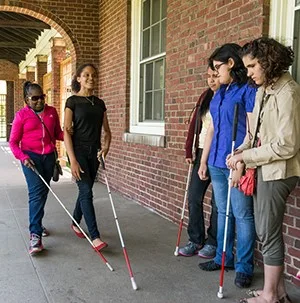Transition to College: Program Activity Guide for Students Who Are Blind or Low Vision
Graduating and moving to college or a career school is crucial for any student. For those who are blind or have low vision, it needs teamwork from the student, parents, teachers, counselors, and rehab professionals. This ensures they get the right instruction. Students with blindness may have increase in challenges. So, the student’s IEP should have goals for college or career prep. Ideally, this starts in middle school. It takes long-term planning and input from everyone involved, especially the student.
College and Career School Readiness Activities for Students Who Blind or Low Vision

Blind or low-vision students who are planning to attend college need to learn and master an array of skills from the expanded core curriculum prior to attending any postsecondary institution. Upon high school graduation, students will be fully responsible for their education. Therefore, specialized instruction is necessary to prepare students with vision loss for what will be expected of them in a new educational setting.
Essential Skills for College- or Career School-Bound Students with Vision Loss
The following skills are covered in the activity guide to help prepare college-bound students who are blind or low vision.
- Researching admissions requirements
- Navigating the application process
- Requesting accommodations for the SAT or ACT
- Applying for scholarships, grants, or loans
- Ordering materials in accessible formats
- Establishing a working relationship with the Office for Students with Disabilities
- Coordinating services with a vocational rehabilitation agency
- Using knowledge of one’s rights and responsibilities as a blind or low vision student
- Independently traveling on campus
- Advocating with professors in a self-determined manner
- Hiring and working with a live reader
In addition to having the necessary skills to sustain good academic standing, students who are blind or low vision also need to acquire skills for managing their personal life and independent living needs.

Features of the Transition to College: Program Activity Guide
The Transition to College: Program Activity Guide was created for teachers of students who are blind or low vision, community rehabilitation program professionals, orientation and mobility instructors, vocational rehabilitation counselors, and students who are blind or low vision who have decided to pursue higher education or training. The activities in this guide support the Workforce Innovation and Opportunity Act (WIOA), which requires vocational rehabilitation agencies to provide counseling on enrollment opportunities in college or career school as well as instruction in self-advocacy to students who are blind. This guide offers over 20 free activities aimed at assisting students with vision loss in understanding their postsecondary education options in relation to their career goals or desired job. These activities can also serve as electronic distance instruction for students in rural areas.
Lessons Available in Multiple Learning Mediums
You can view the lessons online, print them, or download them as an electronic braille file (BRF) in the Unified English Braille Code, ready for embossing. The BRF files are available for download at the bottom of each lesson. Right-click and “save as” to download a file to a computer.
Supplemental Material
The resource College Bound: A Guide for Students who are blind or low vision, 2nd Edition by Ellen Trief, Ed.D., is used as a supplement to the activities in this guide. You can purchase a copy of College Bound from APH Press. The Transition to College: Program Activity Guide was developed by Alicia Wolfe for the American Foundation for the Blind.